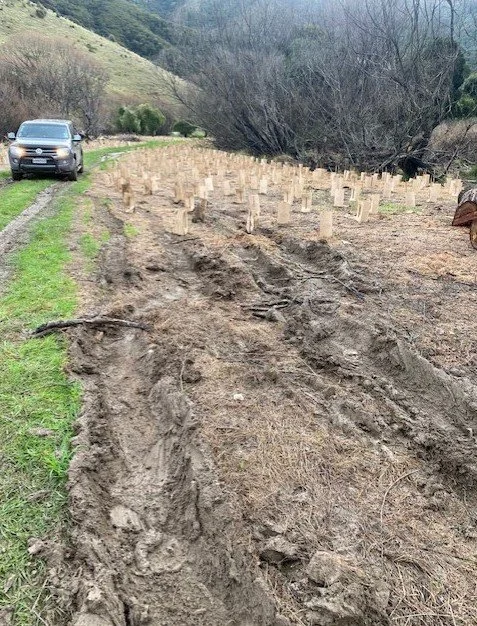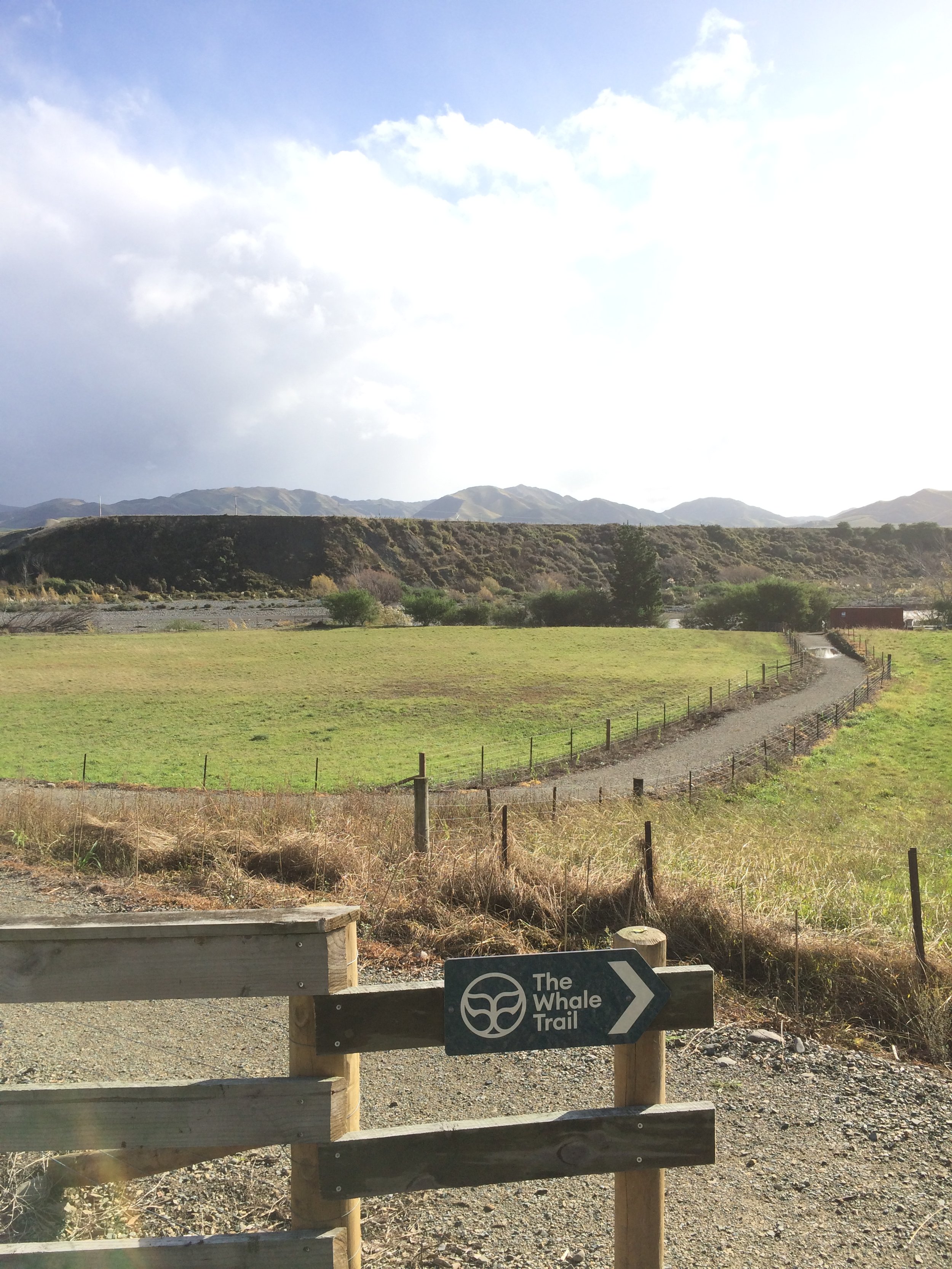FuturEcology & EmGuard ™ June 2022 Update
Hello from the team at FuturEcology and EmGuard,
We hope you are staying dry😊
If you are like us and in the middle of your planting season, I am sure you are a little over the rain. Here we were, worrying about a green drought and how dry the ground was when we started the planting season and now we are awash with mud.
Still, it is great to be getting plants in the ground and working on our mission of saving the planet one tree at a time.
We have had a couple of changes in the team in the past month with Mitch moving on to follow his interest in Bio Security and Meg joining us fulltime having just finished a trainee ranger course at NMIT in Nelson, so it is great to have her on board and we wish Mitch well. Meg brings some great skills around resource management and will provide some welcome horsepower to our team.
Covid continues to provide its challenges, especially around logistics and staffing but as with all New Zealanders we continue to hope for a brighter future and in the meantime we will keep planting those trees. Only about 40,000 to go for this year!
Last week’s challenges – Two stuck vehicles, lots of rain and mud😊
“Just Keep Swimming” - Dory (Finding Nemo)
What a whirlwind of a year it has been. While it seemed that COVID was challenging for the last couple of years, this year is a whole new ball game. Every industry and everyone we have talked to has experienced some challenges as a result of COVID implications. However, in the words of Ali Krieger “you can control two things: your work ethic and your attitude about anything”. While we recognise there have been serious delays and things haven’t gone quite as smoothly as Emma’s colour coded spreadsheet planned, we are doing everything we can to get EmGuards, stakes and weed mats to customers as they need them. We are doing our best to stay positive and keep smiling and we so appreciate everyone’s patience and understanding as we navigate the storm.
We are very grateful to our manufacturer who are installing another machine at the end of June which will more than double our EmGuard production capacity and should dramatically decrease lead times. Hopefully by the time next season rolls around COVID won’t be so prevalent and with our shiny new machine at full throttle, we will have EmGuards to you at the drop of a hat.
Freight is one of the industries really feeling the challenges of COVID and unfortunately prices are going up to account for this. From the 1st of July, freight cost will be going up by 10%. We continue to only charge freight at cost to our customers.
To finish off, a quote from one of Em’s favourite books “Everything is Figureoutable”- Marie Forleo
“Being challenged in life is inevitable, being defeated is optional.” – Roger Crawford
FuturEcology Ltd. have started planting along the Whale Trail Cycleway.
This is an exciting new project that will be forming a cycleway from Picton down to Kaikoura. FuturEcology Ltd. have been engaged by the Whale Trail Trust to develop a planting and maintenance plan along the side of the trail which captures the rich endemism of Marlborough (species which only exist in Marlborough)
We are now in the process of planting these species in pockets along the completed stretch from Blenheim to Seddon.
Here are some snaps of the trail by the Awatere River in Seddon.
Happy Customers!
We love finding out what exciting projects people are using our products for.
Here are two great examples of useful EmGuard applications!
Right: Angelique from Martinborough has protected her mandarin tree using an EmGuard.
Below: Vivienne from Waiheke Island has protected her young trees using EmGuards.
Weed of the Month - Kikuyu
Botanical Name - Cenchrus clandestinus
One of our EmGuard customers has been battling Kikuyu in the Coromandel region and has been experimenting with different control methods. This an excerpt from her email to us summing what they are trying:
“As you may remember kikuyu is our biggest issue for our planting and with a preference to not spray out we did a few trials and I've taken 6 month measurements and will be taking a 12 month measurement soon. It seems that the major variable that determined plant happiness (stem caliper, height, bushiness) was environmental conditions. We are windy and coastal and you could really see on the exposed areas how stunted the natives were from salt spray and wind. The hebes have been the heroes and seem the less affected and less appetising to the hares/rabbits too. Unfortunately our wetland carex really took a hit from the pukeko. The majority of the planted species last year were kanuka and manuka and the hand maintenance was easiest with a wool matting down first then wood mulch on top (with or without a guard). The glyphosate areas vs. non glyphosate areas were only different in terms of stem caliper, with the sprayed out areas measuring thicker, but height & bushiness were similar. We managed 5ha of planting last year.
This year we are keen to not spray to prep so we have chosen the most protected sites, with the least kikuyu, reduced our planting area to 2.5ha, and will plant more densely at 1m spacings. We've been stockpiling a load of wood chip and will look at wool matting as well. There will be a new trial area as I'm keen to explore using Tithonia Diversifolia as a plant "herbicide" as it allopathically repels kikuyu as well as creates a lot of biomass quickly to build a forest floor. This will be highly managed, with active chop and dropping and we plan for it to be present for only 2-3 years max until our natives are well established. Permadynamics has been using this approach successfully up in northland as a forest forerunner for their native areas. I'll let you know how it all goes :)”
Kikuyu grass is a creeping, perennial, bright green, hairy, mat forming grass originally from Central Africa.
It has long stolons which root where they touch down and it will climb up to 2m high if supported by other plants. It has bright green to yellow-green leaves and grows very rapidly, particularly in coastal areas forming dense, almost springy mats. It rarely seeds, spreading mostly by stolon and rhizome fragments.
It tolerates most conditions from wet, to serious drought, hot to moderately cool, salt, wind, stock damage and most soil types, hence its ability to become a problem.
This is because the tight, long-lived mats exclude all other species preventing the establishment of native plant seedlings. It can also block water ways and carries fire.
It has been used extensively for lawns because it is so hardy.
Photo courtesy of Trevor James
Control is usually with chemicals, 520g/L haloxyfop-P-methyl or glyphosate 100ml/L plus penetrant which is most effective if the grass is under stress from drought or other stress.
Weed mat has been effectively used for small areas. If using mechanical control, make sure you have been extremely thorough with removal and burn or dispose of through landfill. Composting is unlikely to be effective for killing the stolons.
Shading through dense planting will help keep it at bay. (Weedbusters)
Interesting Snippets
What we’ve been reading - Entangled Life: Merlon Sheldrake
Mushrooms are abundant at this time of year, but mushrooms are just the fruiting bodies of vast mycelium networks which exist everywhere around us. This book shines a light on just how little we actually understand about fungi, and how incredibly important a role it plays in our ecosystem. Click here to see a quick video intro to the book and its author on YouTube.
What we’ve been watching - A tree a minute: planting 1440 trees in a day
Beau Miles has created this YouTube video about his experience in planting trees. Here is an excerpt from his introduction:
"As there are 1440 minutes in a day, and I love planting trees, I decided to plant a tree a minute for 24 hours. It was (swear meaningfully) hard.
For my 40th birthday, my best mates gave me a self-flown joy flight in a light plane. When given the controls I headed for home. What was at first a wonderful sense of flying became a bizarre reality check, seeing so much green turning to brown in the summer heat. Most creek lines were bare, and the general lack of bushland within the giant quilt of farmland was shocking.
You don’t see this contrast from the ground, always seeing a tree in the foreground, or a hedgerow in the middle distance. A single big gumtree can give the impression of health, yet the area I live in is a mostly deforested farmed zone exploited for its impressive topsoil.
Having tapped into the potential of a 24 hour period of life, and since I love planting trees, I decided to plant a tree a minute on a friend's dairy farm by reforesting a creekline.
Low and behold, planting that many mixed trees on muddy terrain, slipping on my arse every other minute, is one of the hardest, most rewarding single days of my life."
Watch it here.
In closing..
This week we are excited to welcome some of the team from Hamilton who manufacture our EmGuards to our great wee city of Nelson. It is a chance for us to showcase some of the amazing planting projects happening in the region and to talk strategy to help combat the supply chain issues that we are all having.
We have EmGuards on hand for smaller orders, but if you have a larger order please make sure you give us plenty of notice.
Bamboo stakes continue to sit on a ship somewhere in the ocean at the moment, so again, if you need them please get in touch so we can ensure continuity of supply.
Thank you.






